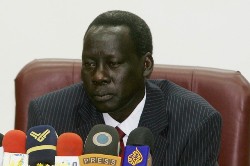South Sudan vows readiness to redesigning ties with U.S.
August 23, 2017 (JUBA) – South Sudanese government pledged on Wednesday its readiness to redesign its bilateral relations with the people and the government of United States.

“A good friend would come out and tell you from the bottom of his heart whatever he sees that you need to fix. This does not mean the friend does not like you. At the moment the two nations maintain a cordial relationship. Relations between the two countries are traceable as far back as before the war of liberation struggle”, explained Foreign Minister Kuol to Sudan Tribune on Wednesday.
The minister said the two nations would eventually overcome the current situation and move on to redesigning how best they could work together to revert the past in order to consolidate efforts.
“Yes, the leaderships and people in the two countries are aware of challenges they dealing with at the moment but this should not be interpreted to mean the two countries will never get back to the situation they were in the past. The situation will change and it will be the opportunity to redesign how they would restructure bilateral relations in various areas for mutual benefits of the citizens of the two countries,” he explained.
His comments after American senators wrote a letter addressed to U.S. Treasury Secretary Steve Mnuchin, pointing out the United States has a strong and unique bond with the people of South Sudan through America’s key role in the formation of South Sudan as an independent state.
Senate Foreign Relations Committee Chairman Bob Corker and Senator Chris Coons said the international diplomatic response to the ongoing war in the young nation has failed and donors have focused on providing urgent humanitarian relief which reached almost $3 billion since December 2013
“Despite initial optimism about the future of the world’s newest country, the people of South Sudan have spent the past three years entangled in a brutal conflict, which has spiralled out of control, with more than two million people internally displaced and almost two million forced from the country,” U.S. legislators wrote.
The United States, according to the senators, must simultaneously address the structural problems that enable kleptocracy, incentivize violence, and prevent peace.
They demanded a more transparent and responsible government in the future, adding that this includes regional responsibility for impunity and the negative physical and human impact it has on stability and development in the region.
The lawmakers called upon the Treasury to also focus on deploying financial tools that target the financial networks of those obstructing peace and dispersing the proceedings of corruption through the region, and even through America’s financial system.
“We ask the Treasury Department to act to hold South Sudanese leaders accountable. We urge you to investigate corruption, impose network-focused sanctions, identify hidden assets and collaborate with international anti-money laundering standard setting bodies,” they added in the letter.
Corker and Coons pointed out that holding South Sudanese leaders in key decision making positions accountable will send a signal to the government in Juba and the region that bad governance by political and military elites will no longer be given space in the international capital markets for impunity.
“Those fighting in South Sudan will not agree to a sustainable peace until the international community develops more robust leverage and deploys stronger pressure. “We believe the United States can increase the pressure and change the calculations of those profiting from conflict,” they wrote
The American politicians revealed in an August 1, 2017, letter that their intent is to stop the free flow of resources to the political and military leaders, their families and associates through Uganda and Kenya, engagement with international financial institutions and network-focused sanctions.
U.S. Ambassador to South Sudan Molly Phee also on Monday expressed publicly the disappointment of her country with the performance of the government in Juba, saying the relationship between the countries were now not strong as it was before.
The U.S. diplomat attributed the deteriorating in ties continuing war, corruption and the mistreatment of aid workers in the world’s youngest nation.
(ST)
